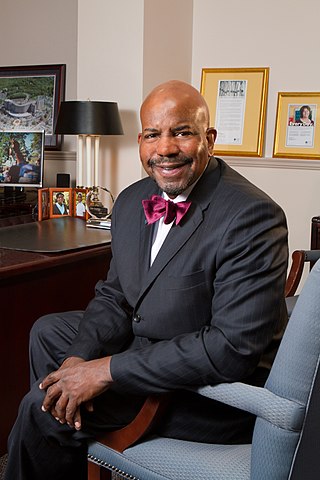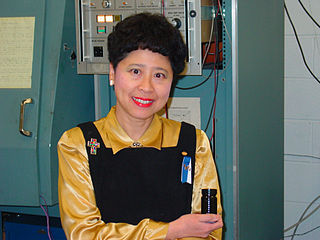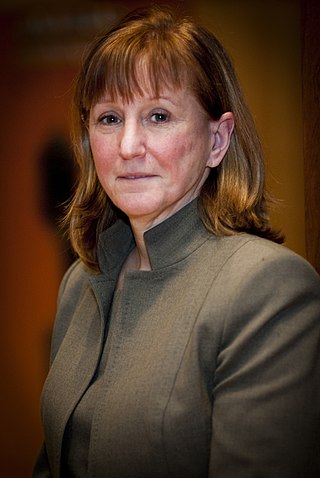Related Research Articles
Lisa C. Klein is an American engineer. She is a distinguished professor of engineering at Rutgers University in New Jersey. In 1977, she became the first female faculty member in the Rutgers School of Engineering. She is the director of the graduate program in the Department of Materials Science and Engineering.

Cato T. Laurencin FREng SLMH is an American engineer, physician, scientist, innovator and a University Professor of the University of Connecticut.

Deborah Duen Ling Chung is an American scientist and university professor.

Subra Suresh is an Indian-born American engineer, materials scientist, and academic leader. He is currently Professor at Large at Brown University and Vannevar Bush Professor of Engineering Emeritus at the Massachusetts Institute of Technology (MIT). He was Dean of the School of Engineering at MIT from 2007 to 2010 before being appointed as Director of the National Science Foundation (NSF) by Barack Obama, where he served from 2010 to 2013. He was the president of Carnegie Mellon University (CMU) from 2013 to 2017. Between 2018 and 2022, he was the fourth President of Singapore's Nanyang Technological University (NTU), where he was also the inaugural Distinguished University Professor.
Atul Harish Chokshi is an Indian materials scientist, metallurgical engineer and a professor at the Department of Materials Engineering of the Indian Institute of Science. He is known for his studies on high temperature deformation and failure of ceramic materials and is an elected fellow of all the three major Indian science academies viz. the National Academy of Sciences, India, Indian Academy of Sciences, and Indian National Science Academy as well as the Indian National Academy of Engineering. The Council of Scientific and Industrial Research, the apex agency of the Government of India for scientific research, awarded him the Shanti Swarup Bhatnagar Prize for Science and Technology, one of the highest Indian science awards for his contributions to Engineering Sciences in 2003.

Ulrike Diebold is an Austrian physicist and materials scientist who is a professor of surface science at TU Vienna. She is known for her groundbreaking research on the atomic scale geometry and electronic structure of metal-oxide surfaces.

Judith Louise MacManus-Driscoll is a Professor of Materials Science at the University of Cambridge. Driscoll is known for her interdisciplinary work on thin film engineering. She has a particular focus on functional oxide systems, demonstrating new ways to engineer thin films to meet the required applications performance. She has worked extensively in the fields of high temperature superconductors, ferroics and multiferroics, ionics, and semiconductors. She holds several licensed patents.
Ruth Cameron FInstP FIOM3 FREng is a British materials scientist and professor at the University of Cambridge. She is co-director of the Cambridge Centre for Medical Materials, where she studies materials that interact therapeutically with the body. Since October 2020 she has been joint head of the Department of Materials Science and Metallurgy at Cambridge.
Viola Ingrid Birss is a Professor of Chemistry at the University of Calgary. She works on electrochemistry and the development of nanomaterials for sustainable energy and sensing applications. She has demonstrated a metal oxide perovskite that can be used as the air and fuel electrode in solid oxide fuel cells, as well as creating nanoporous carbon scaffolds to be used in batteries and capacitors.

Katherine T. Faber is an American materials scientist and one of the world's foremost experts in ceramic engineering, material strengthening, and ultra-high temperature materials. Faber is the Simon Ramo Professor of Materials Science at the California Institute of Technology (Caltech). She was previously the Walter P. Murphy Professor and department chair of Materials Science and Engineering at the McCormick School of Engineering and Applied Science at Northwestern University.
Helen M. Chan is the New Jersey Zinc Professor at Lehigh University. Her work considers the development of ceramic-metal nanocomposites. She is on the board of directors of the American Ceramic Society.

Dawn Austin Bonnell is the Senior Vice Provost for Research at the University of Pennsylvania. She has previously served as the Founding Director of the National Science Foundation Nano–Bio Interface Center, Vice President of the American Ceramic Society and President of the American Vacuum Society. In 2024, she was elected to the American Philosophical Society.
Kathleen Ann Cerqua-Richardson is an American physicist and the Pegasus Professor of Optics & Photonics, Materials Science and Engineering at the University of Central Florida. She is a Fellow of SPIE, the American Ceramic Society and The Optical Society. Her research considers the synthesis and characterisation of novel glasses and ceramic materials.
Beatriz Noheda is a professor at the University of Groningen and the director of the Groningen Cognitive Systems and Materials Center. She is particularly well known for discovering the monoclinic phase at the morphotropic phase boundary in lead zirconate titanate (PZT) and other piezoelectrics, for her pioneering work in ferroelectric hafnia and for the development of memristors.

KatalinBalázsi is a Slovakia-born Hungarian material scientist. She is the head of the Thin Film Physics department in the Institute of Technical Physics and Materials Science, a component of the Centre for Energy Research, Eötvös Lóránd Research Network. She has also served as the President of the Association of Hungarian Women in Science (2018-2021).
Keith John Bowman is a materials scientist and dean of the University of Maryland, Baltimore County College of Engineering and Information Technology, working to advance research benefiting society and elevating student educational success. He is a Fellow of The American Ceramic Society. Bowman has worked extensively to advance diversity, equity, and inclusion across engineering disciplines and the science, technology, engineering, and math (STEM) pipeline. He is a member of 500 Queer Scientists. He is internationally recognized for his research on the property anisotropy and preferred orientation in ceramics and ceramic composites.

Dana Grace Goski is a Canadian-born materials scientist, past president of The American Ceramic Society (ACerS), and vice president of research & development at Allied Mineral Products, Inc. During her tenure as ACerS president, she extensively supported the mission and activities of the Society's Diversity & Inclusion Subcommittee and the International Ceramic Arts Network (ICAN), the Society's member organization for clay artisans and potters.
Linda Ellen Jones is an academic in the field of chemical engineering, and known for her work in high temperature chemistry. She is a professor at Western New England University and an elected fellow of the American Ceramic Society.
Tina M. Nenoff is an American materials scientist and chemical engineer who works as a senior scientist and Sandia Fellow at Sandia National Laboratories, on leave from Sandia for a two-year term as deputy and science advisor to Jill Hruby, the Under Secretary of Energy for Nuclear Security. Her research concerns nanoporous materials such as zeolites and metal–organic frameworks, and their applications including reverse osmosis, water splitting for the hydrogen economy, and the detection and sequestration of radioactive iodine produced as nuclear waste. She also developed crystalline silicotitanates used to remove radioactive cesium from contaminated seawater after the Fukushima nuclear accident.
Michele V. Manuel is an American materials scientist whose research topics have included biodegradable materials for medical implants, and high-strength self-healing alloys for aerospace applications. She is the U. S. Steel Dean of the Swanson School of Engineering at the University of Pittsburgh.
References
- 1 2 "Lynette Madsen '94", McMaster University Alumni, retrieved 2024-09-27
- 1 2 "Lynnette Madsen", Staff directory, National Science Foundation, retrieved 2024-09-27
- 1 2 3 4 5 "Lynnette Madsen", Directory, Cornell Materials Science & Engineering, retrieved 2024-09-27
- ↑ Lyons, Karen Swider (September 2017), "Review of Successful Women Ceramic and Glass Scientists and Engineers", MRS Bulletin, 42 (09): 684, doi:10.1557/mrs.2017.201
- 1 2 "Lynnette Madsen", Diversity in the Minerals, Metals, and Materials Professions, The Minerals, Metals & Materials Society, 2016, retrieved 2024-09-27
- ↑ Claire L. Felbinger Award for Diversity and Inclusion, ABET, retrieved 2024-09-27